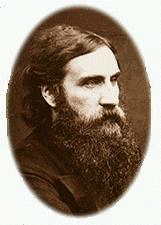 George
MacDonald (1824-1905) is best known as a novelist, the author of fantasies
such as Phantastes (1858) and Lilith (1895) and realistic
works like David Elginbrod (1863) and Alec Forbes of Howglen
(1865). He was also, however, a respected religious teacher. He pastored
only one church — Trinity Congregational Church, Arundel, 1850-1853 — before
turning to novels and poems, but he continued to preach and publish sermons
after achieving literary fame.
George
MacDonald (1824-1905) is best known as a novelist, the author of fantasies
such as Phantastes (1858) and Lilith (1895) and realistic
works like David Elginbrod (1863) and Alec Forbes of Howglen
(1865). He was also, however, a respected religious teacher. He pastored
only one church — Trinity Congregational Church, Arundel, 1850-1853 — before
turning to novels and poems, but he continued to preach and publish sermons
after achieving literary fame.
Until recently, our knowledge of MacDonald's homiletics was limited to the sermons he wrote for publication: The Miracles of Our Lord (1870), The Hope of the Gospel (1892), Unspoken sermons (3 vols, 1867-1889) and the discourses he incorporated into many of his novels. We now have records of the sermons he preached as well: J. Joseph Flynn and David Edwards have located 20 transcripts in Victorian periodicals and published them as George MacDonald in the Pulpit: The 'Spoken' sermons of George MacDonald (Whitethorn, CA: Johannesen Printing and Publishing, 1996).
MacDonald's contemporaries had mixed reactions to his preaching. Many readers found fault with the sermons in his novels. Reviewers complained that Harry Walton, protagonist of The Seaboard Parish, "is always preaching"; dismissed Paul Faber, Surgeon as little more than a "lay sermon"; and declared that MacDonald's didacticism in Robert Falconer was "suicidal to his art" ("George MacDonald as a Teacher of Religion" 423; reviews qtd. in Hein 184, 310).
His other sermons were much more positively received. Those who heard him preach described his sermons as "brave and manly" (Brooks, qtd. in MacDonald, An Expression of Character 220n.), "simple yet most profound" ("A Great Scottish Teacher" 383), and "streaked everywhere with fine touches of poetic expression" (Dexter, qtd. in George MacDonald in the Pulpit 25). Those who read his sermons were also impressed by his "searching spiritual power" ("A Great Scottish Teacher" 383). One reviewer called the first volume of Unspoken sermons "a really remarkable book" and called some of the discourses in the second collection "arresting," "illuminating," and "singularly profound" ("Mr. George MacDonald's New sermons" 852-53). Perhaps the highest praise came from John Ruskin, who asserted that volume one of Unspoken sermons contained "the best sermons — beyond all compare — I have ever read" (qtd. in Greville MacDonald, George MacDonald and His Wife 337.)
Bibliography
[Adapted from Chapter 6 of The Victorian Pulpit: Spoken and Written sermons in Nineteenth-Century Britain.]
Additional adaptations of the Victorian Pulpit available on the Victorian Web
- Theories of Preaching
- Methods of Delivery
- Well-Known Preachers
- Sermon Publishing and Reviewing
- The "Efficiency" of Victorian Preaching
- Charles Haddon Spurgeon
- John Henry Newman
- Bibliography
- Table of Contents of the Print Version
Last modified 1998
Last modified 11 April 2018